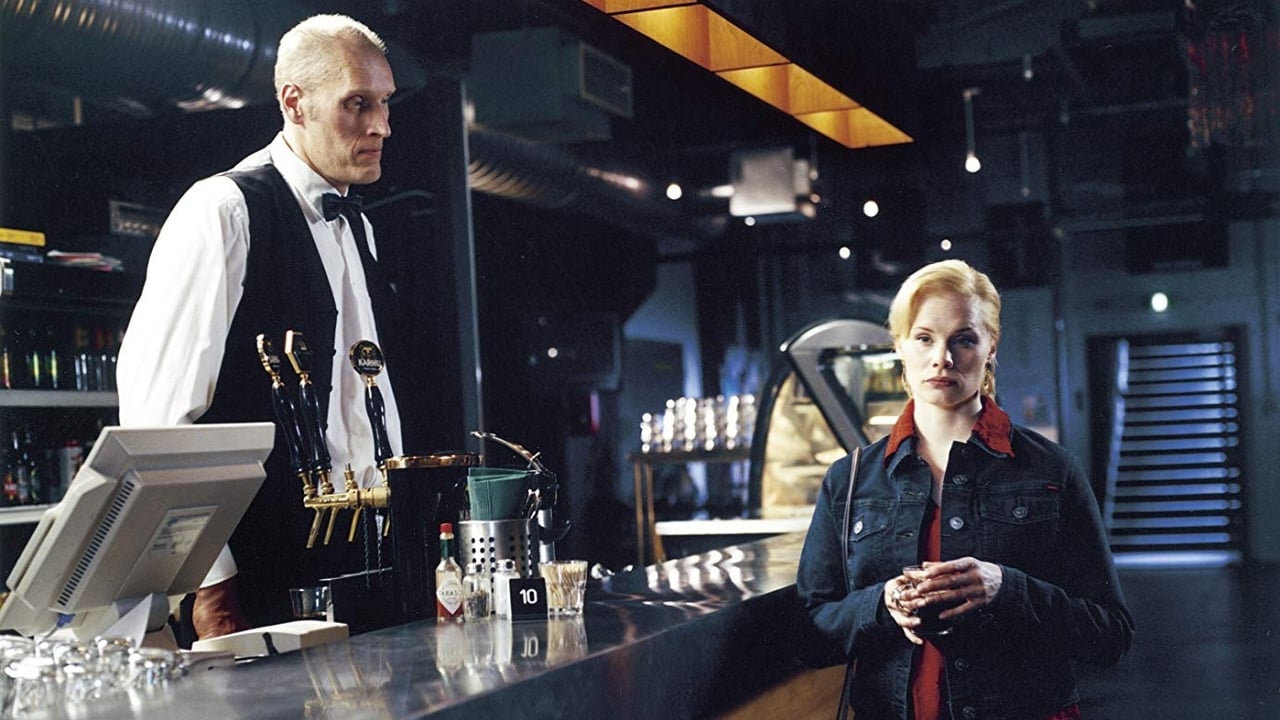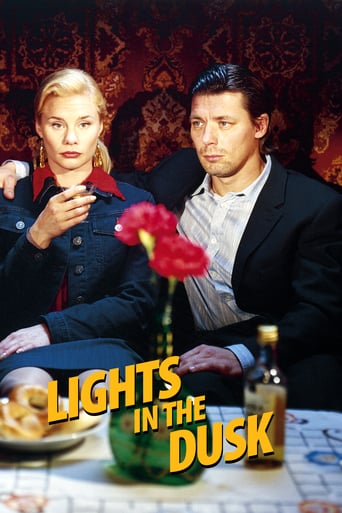

Plot: A lonely security guard is manipulated by a femme fatale working for a gang of jewel thievesThis is a film that is so bleak that it actually becomes very funny, in a slightly hysterical sort of way. It was recently broadcast in the UK at 2am, which must have made for a surreal viewing experience. The plot is minimal, the characterisation light, and the script short. Much of the film is taken up with long silences (in which the characters smoke), songs being played in full, and lengthy shots (check out the one of a card game in the gangster's den, where the femme fatale vacuums the carpet). The protagonist never actually does anything, preferring to simply let events wash over him, and for a thriller there are no thrills. Nor is there any action, or humour, or human warmth (the final shot excepted). Nonetheless, the film is gripping in a curious way, its bleakness and underdog hero proving strangely compulsive viewing.
... View MoreLights in the Dusk is another in the series of movies about Finnish life that contain the same elements; deadpan dialog, subtle humor, stubborn protagonists, semi-happy endings. If you're into this style of film, you'll really like it. However, it's an acquired taste, not for everyone.Our anti-hero is a security guard, caught up in a criminal plot, ultimately taken advantage of by a beautiful femme fatale but redeemed by the love of a good woman. That sounds like a simple plot, but as seen in the movie it's anything but simple.I've seen references to a trilogy, mentioning this film along with Man Without A Past and Drifting Clouds. That seems to ignore Match Factory Girl, which fits right in with the rest. I've seen most of Kaurismaki's work and liked everything, I really groove to the retro style, the deadpan acting, the plots which seem simple but are in fact very complicated.If you like Kaurismaki, or are in the mood for something different, check it out. At the very least you'll remember it and think about it.
... View MoreLike Kaurismaki's two previous films, 'Drifting Clouds' and 'Man Without a Past', this conjures up a world of despair, but shot in the Formica tones of a Doris Day comedy, without the emollient presence of incidental music. The protagonist is almost totally inarticulate; it's impossible to tell whether this is through depression or dictated by an immutable moral stance. The night watchman, Koistinen, will not reveal the identity of the girl who set him up, exploiting his love-hunger, even when it results in his taking the rap for a bank robbery. At the same time he is blind to the love felt for him by an honest and wholesome burger-stall owner. The film takes in the breadth of Finnish society from dreadful poverty to obscenely glossy wealth, in murky aerial shots of the city as much as in the close-ups. Rather than stand up for himself, Koistinen practically sets himself up again and again, getting knocked down, or beat up on a regular basis. He is reminiscent of Meursault, the hero of Camus' The Outsider, who cannot produce the basic reactions and hypocrisy that society expects of him. But as with 'Drifting Clouds' the piling-up of grief and injustice leads to a tiny spark of hope in the final frames - and Kaurismaki admits to being a soft-hearted old man, so he expects us to see it that way. En route, it's a strange and dreamlike experience, being in the world of Kaurismaki. CLIFF HANLEY
... View MoreI saw this at the 2007 Palm Springs International Film Festival and it's a drama that's so over the top that it's essentially a comedy and a parody of French New Wave films of the late 50's and early 60's. This is written, directed and produced by veteran Finnish filmmaker Aki Kaurismäki and beautifully shot by veteran cinematographer Timo Salminen with a wonderful production design from Markku Pätilä. This is the story of a lonely and picked upon security guard who we only know by his last name of Koistinen. He's a nice enough guy who's not bad looking but kind of short and wears slick backed greasy hair. He has no friends or girlfriends and fails to notice that the equally mousy hot dog vendor Aila has a crush on him. Koistinen doesn't fit in with the others at work and has plans to start his own security business. One day he meets the beautiful Mirja who befriends him with the premise of a possible unlikely relationship but she is the moll of a gangster named Lindholm and is only using Koistinen. All the characters play it extremely straight with very little emotion even when angered and never smile. I've never seen a film with so much smoking of cigarettes in it. Ashtrays are filled to the top and smoking is in virtually every scene. There are subtle comedic scenes throughout and I would probably need to see this a second time to catch ones I missed like when Mirja is vacuuming Lindholm's apartment. This is not a great film but it's different enough to be good and even though I only give it a 6.5 out of 10 I wouldn't mind seeing it again. This may even have the possibility of being a personal cult favorite of mine in years to come and my rating could go up.
... View More